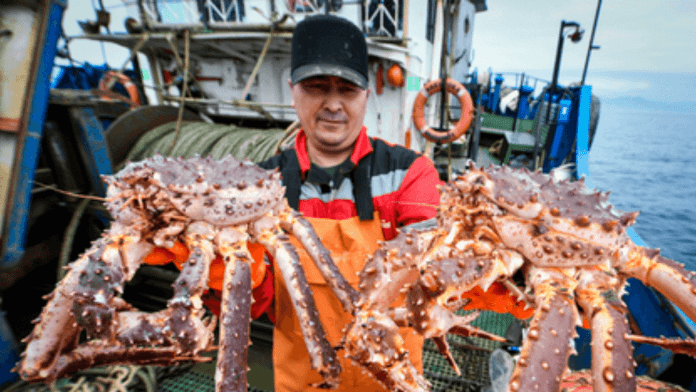News in Brief:
– China’s ban on Japanese seafood has led to a 33% increase in Russia’s crab exports to China in 2023.
– This shift offers opportunities and challenges for international markets due to increased competition and changes in supply chains.
In recent years, China has become a significant player in the global seafood market, and its relationship with Russia’s seafood industry has grown substantially. According to a report, Russia’s crab export to China rose by a staggering 33% in 2023 alone.
This surge is driven primarily by China’s ban on seafood imports from Japan due to concerns over treated radioactive wastewater from Fukushima. Consequently, Chinese consumers are increasingly turning to Russia’s Far East for their seafood needs.
Last year, seafood exports from Russia’s Primorsky and Sakhalin regions soared by 72%, making China the top buyer.
This shift has major implications not only for Russian and Chinese markets but also for the global seafood industry. With China redirecting its seafood imports, Russia’s Vladivostok-based company, Russian Crab, seized the opportunity, significantly expanding its market share. The company, which holds an impressive annual quota of 182,000 tons in the Bering Sea, the Sea of Okhotsk, and the Sea of Japan, plans to expand its exports even further in 2024.
This expansion is supported by the Russian government’s allocation of over three billion rubles ($33.8 million) to build new fishing vessels to enhance the capacity of the country’s Far Eastern fishing fleet. Russian Crab plans to further boost exports of live and frozen seafood to the Asia-Pacific region.
In addition, Western sanctions on Russia have also pushed Moscow to find new markets in the East. Consequently, China has become Russia’s largest trade partner, overtaking traditional buyers in the West.
Implications for African and global farmers
- Market opportunities: For African countries which are listed among the top buyers of Russian fish products, this shift presents both opportunities and challenges. The increased availability of Russian seafood could lead to more competitive prices and better supply consistency. Nigerian traders and consumers might benefit from this increased competition as market prices could fall.
- Supply Chain adjustments: Changes in major supply routes can affect local prices, availability, and even the types of seafood that are accessible. Adapting to these changes can help local businesses thrive in a dynamic market.
- Geopolitical awareness: Understanding the geopolitical context is crucial for African farmers and businesses. The sanctions on Russia and the trade policies of major players like China can have ripple effects globally. Keeping abreast of these developments helps in making informed decisions and strategic planning.



